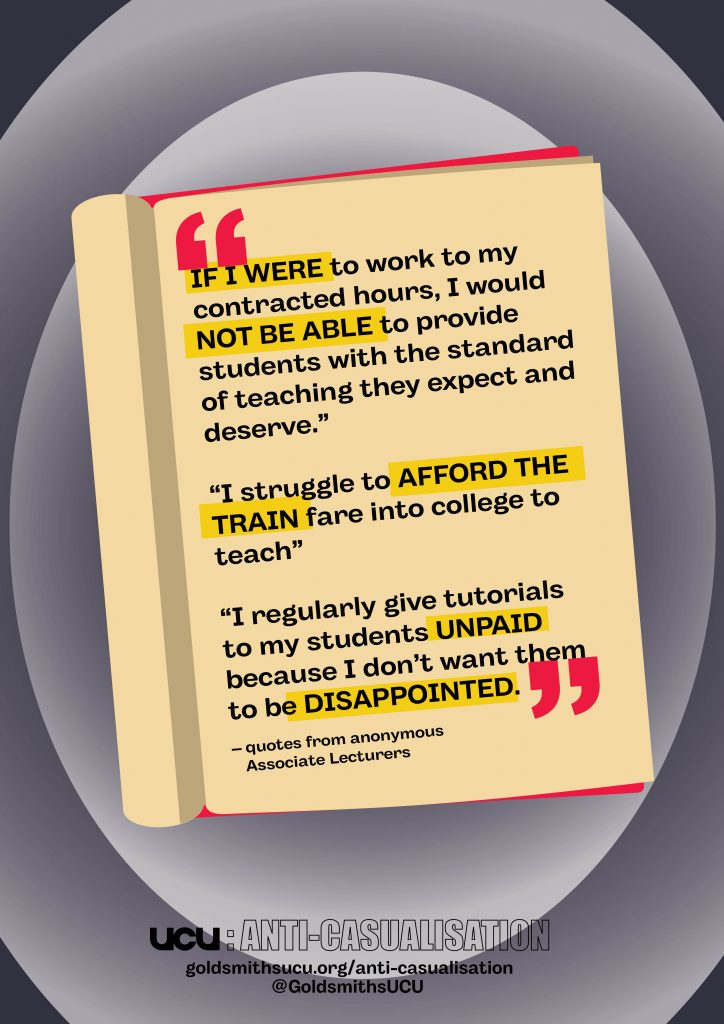GUCU Motion passed GUCU Branch meeting 18.05.2020
Casualised staff – those on hourly-paid, fixed-term or outsourced contracts – within HE face precarious conditions while delivering key front line teaching and support. While casualisation was a key issue of the UCU strikes 2019/2020, the Covid-19 crisis has further heightened the impacts of casualisation. Casualised workers are facing economic and professional insecurity in a time when it will be almost impossible to secure alternative employment. At Goldsmiths, where casualised workers make up a significant proportion of academic and professional staff, now is the time to employ every available mechanism to ensure that they are protected and supported. These colleagues deserve the same level of respect and the same rights as permanent colleagues. Moreover, we all know how crucial their work will be in pulling Goldsmiths through this crisis. Without our casualised colleagues, the workload (including frontline teaching, administration and pastoral care) for permanent academics will increase exponentially and research time will be almost non-existent..
This branch recognises:
- Casualised workers at Goldsmiths (including hourly paid staff, fixed-term staff, ALs and GTTs, short course teachers, etc) perform crucial, often poorly compensated, work, and deserve the same security as permanent colleagues, including contract renewals, extensions, or continued pay for the duration of the crisis.
- Casualisation at Goldsmiths has exacerbated the anxiety and stress faced by Goldsmiths employees during the Covid-19 crisis.
- That the threatened loss of casualised staff risks decimating the capacity of casualised and/or early career scholars, with no guaranteed ‘return’ to academic work. This will disproportionately impact women, BAME, disabled and working class colleagues, aggravating the racial, gendered, and class disparities that already exist at Goldsmiths.
- This loss of valued colleagues would exacerbate existing workload issues for all staff, including permanent staff, which would also impact on teaching and research capacity. Departments need increased capacity as a result of the crisis, given potential illness of colleagues and the switch to remote working, making the work done by casualised staff even more essential.
- Less favourable treatment of part-time and casualised colleagues in relation to the Corona Virus Job Retention Scheme constitutes discrimination.
This branch resolves to:
- Call on Goldsmiths to extend the contracts of all casualised staff until 31 October.
- Call on members to refuse additional workload created by the redundancies of any casualised staff.
- Call on senior management to take a pay reduction in order to fund the continued employment of casualised colleagues during the Covid-19 crisis.
- Permanent staff to establish and contribute to a solidarity fund to support casualised staff threatened by redundancy and through any action that they may choose to take.
- Call on Goldsmiths to, where necessary, explore the possibility of furloughing casualised staff (following contract extensions) through the government’s Coronavirus Job Retention Scheme.
- Call on SMT, HR and DBMs to honour the additional hours worked during migration to online teaching at the beginning of lockdown. These payments have been agreed by Goldsmiths SMT but payments have been effectively withheld for several weeks.
- Call on Goldsmiths to enter into full and open consultation with UCU on any proposed redundancies (including contract non-renewals), including redeploying staff instead of terminating them, and to confirm that staff on fixed term contracts will not be discriminated against or automatically dismissed
Whatever the status of Goldsmiths post-Covid-19, solidarity and collective action will be more important than ever.
